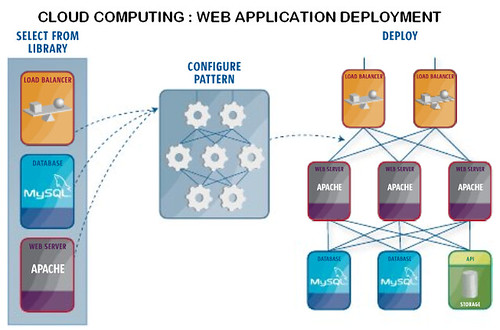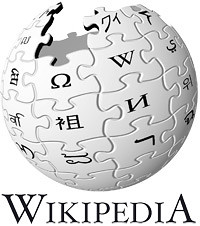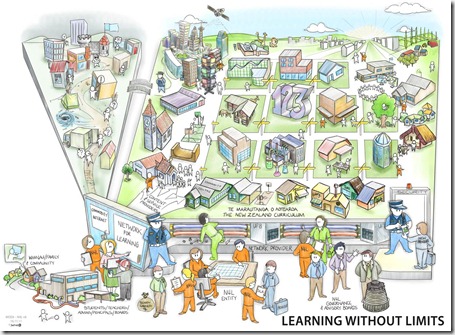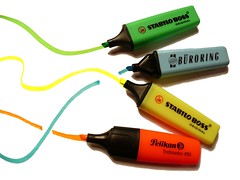The Super Book of Web Tools for Educators has a plethora of tips and ideas for teachers in primary, intermediate, and secondary schools, with focus on topic areas such as ESL/EFL. Tools have been selected and described for their suitability for students at different stages, and there are suggestions for how you and your learners might create the most effective learning opportunities with them. Well worth a look.
.
Friday, January 27, 2012
Thursday, January 26, 2012
2012 Predictions – Technology Will Shape Who We Are
 John Owen shared the following blog post by Brian Hopkins, 2012 Predictions – Technology Will Shape Who We Are As People And Businesse with the comment "this might be interesting". Brian refers to the notion that we are now using technology ubiquitously and this is shaping how and who we are (this is discussed further in this post: More or less human? We are all cyborgs now). It was also interesting to note Brian's prediction that the push toward cloud computing as the panacea to many IT problems will reduce...and his reasons why. Mobile, he feels, will continue to help enhance customisation of learning experiences, contextualisation, and social collaboration. Well worth having read (thanks, John).
John Owen shared the following blog post by Brian Hopkins, 2012 Predictions – Technology Will Shape Who We Are As People And Businesse with the comment "this might be interesting". Brian refers to the notion that we are now using technology ubiquitously and this is shaping how and who we are (this is discussed further in this post: More or less human? We are all cyborgs now). It was also interesting to note Brian's prediction that the push toward cloud computing as the panacea to many IT problems will reduce...and his reasons why. Mobile, he feels, will continue to help enhance customisation of learning experiences, contextualisation, and social collaboration. Well worth having read (thanks, John).The blog post appears as follows: In the first phase of the information age, technology helped us achieve new levels of productivity. In the next phase, technology will shape who we are. Why? Because technology is everywhere – and savvy businesses are paying attention. I did a check on a recent trip and noticed that, on average, 80% of the people around me were nose down in their technology. That’s amazing if you stop and think about it….(pause for thinking)…When you spend that much time using something, it ceases to be a helper and starts to shape who you are.

I think 2012 will be a watershed year for the global business environment as technology moves from being “out there” to “part of us.” In 2020, we will look back on 2012 not as the year the world ended but as the year it changed for good. Check out the TED video We Are All Cyborgs Now. Here are four predictions about business in 2012 that all start with the fusion of business and technology and the impact that it will have on shaping business. I hope will add some new thought food to your mental garden:
- “Big IT” continues its vanishing act. In 2010, we wrote about the crumbling of IT in our report “BT 2020: IT's Future In The Empowered Era,” and I drew some sharp criticism earlier in the 2011 when I blogged “What Happens When Central 'IT' No Longer Exists?” It would be interesting to see if anybody has changed their mind over the year. With so many choices for acquiring technology, this vanishing act should come as no surprise. Consider: Many SMBs I talk to are adopting a cloud-first policy and eschewing investment in big enterprise systems, while larger enterprises look around them and scratch their heads trying to figure out how they can do the same. I predicted in “The Top 10 Technology Trends EA Should Watch: 2012 To 2014” that leading IT shops will become service brokers, and 2012 will see that become reality.
- Data hype turns to focus. More than half of the trends in “The Top 10 Business Technology Trends EA Should Watch: 2012 To 2014” were directly or indirectly about data. Why? We all know it is “exploding.” What’s new is that we can finally do something about it. Our answer through 2010 was to deal with the data explosion by “managing it better.” Big data, massive parallel processing, advanced analytics, eventually consistent NoSQL databases, etc. are arriving that recognize that the chaos will never be managed. Leading firms in 2012 will let go and learn to live in the chaos, focusing on what they can control. The data hype will continue, but enterprise deployments of big data systems will lead to focused results for the front-runners.
- Social and mobile converge on local. SoLoMo is a new, catchy buzzword that I’ve been tweeting about lately, and it has been blogged about on both NY Times and Forbes. The term indicates that the future of mobile computing is to connect users socially in a local context – that is, without needing to go through some big social software in a data center somewhere. I read about a great example just yesterday in which a college professor designed an iPad app that let his students collaborate visually on his lecture notes there in the classroom. The applications of this concept outside the classroom are limitless. We call this the App Internet (see our founder’s August 2010 blog post). In 2012, leading companies will really figure out how to exploit this to: 1) disrupt how products and services are sold, and 2) empower their workforce to meet consumers where they are.
- Cloud migration begins in earnest. Last, I had to say something about the cloud, because it was THE HOT TOPIC of our July emerging technology tweet Jam. I think cloud hype reached a crescendo in 2011 and will significantly subside in 2012 as reality sets in and enterprises get down to the hard work of making it real. I say this because in the many reports, blogs, articles, and tweets I’ve read, a few themes stick – it’s not always cheaper, you have to know when it’s appropriate, and your environment must be ready for it (that’s a really squishy way of saying application architectures must be elastic, security issues must be resolved, policies must be in place, skills must be present, etc.). My prediction for 2012 is that we will see far less media hype about cloud as some real solutions hit the market and clients get their cloud plans off the ground. What does this have to do with my theme? Cloud is a platform that further's the proliferation of technology into business and our lives.

Cloud Computing Web Application Deployment by louisvolant
Descending clouds by Gary Hayes
Labels:
"cloud computing",
"predictions for 2012",
"Social media",
Big data,
Brian Hopkins,
Business technology,
cloudcomputing,
cyborgs,
data,
John Owen,
mlearning,
NoSQL,
Prediction,
predictions,
SoLoMo
Thursday, January 19, 2012
Inspiration, skills, and feedback via video: Introducing Russell Stannard

Have you come across Russell Stannard? He has been doing some really interesting things around recording video feedback for students, as well as creating (free) videos for teacher professional development. It is well worth checking him out, especially if you teach English as an Additional Language or have a similar language support role.
Below is an extract from the monthly newsletter that you can subscribe to if you want to stay up to date with the work Russell is doing.
"Welcome to the January 2012 TeacherTrainingVideos.com newsletter. Happy new year to you. I didn't send out a newsletter in December so you will get 2 this month and each one will have new content. I have quite a few new videos set up to share.
This month there are new videos on how to use Smartboard software. So if you use a Smartboard IWB then these videos will really help you. There are also new videos on the fabulous Audioboo podcasting tool. If you want to create podcasts or get your students to create them, then you will find these really useful. There is also a set of videos on a fabulous video mail tool, which is great for getting your students to do speaking activities. There is also my latest audioboo, an recent article of mine in the Guardian and lots more: http://www.teachertrainingvideos.com/iwb2/index.html
Audioboo-Great Podcasting Tool
Audioboo is a great tool for podcasting and it is free. It can also work with smart phones, so great for doing podcasts on the run. The videos take you through everything and even show you how to connect your audioboos so that they can be found on iTunes! Great tool and easy to use.
http://www.teachertrainingvideos.com/audioboo/index.html
Jing
If you want to learn to use JING, the fabulous tool I use for creating the feedback videos, then here is the link.
http://www.teachertrainingvideos.com/Jing/index.html".
Wikipedia blacked out to protest
Michael Winter shared the announcement that Wikipedia has been "blacked out for 24 hours to protest against proposed legislation that threatens freedom of expression on the Internet.To find out more try accessing Wikipedia as normal or go to: http://en.wikipedia.org/wiki/
 Image via CrunchBase
Image via CrunchBase
 Image by Octavio Rojas via Flickr
Image by Octavio Rojas via Flickr
Nick Ford added the comment "For me a locked down/user pays manifestation of the Internet rather than the Internet the world is currently blessed with is something to be vigilant against. For more information visit Stanford Centre for Internet and Society (CiS) and read 'STOP SOPA'. Lawrence Lessig is the founder of CiS and Creative Commons".
 Image via CrunchBase
Image via CrunchBaseI wholeheartedly agree that the Internet needs to remain as open and accessible, and that the whole notion of copyright is an outmoded, artificial construct that has been placed on creativity and innovation by folk who see a direct cause and effect between the creation of something, and making a buck. The reason I feel it's artificial is that invention and art (to name but two) have always been a constant collaborative effort, where one thing builds on another - often extending it. The lightbulb could not, for example, have been invented if a whole heap of work had not been done around electricity, resistance, and the materials required to make the physical object. How can you copyright / patent that?
 Image by Octavio Rojas via Flickr
Image by Octavio Rojas via FlickrThe whole notion also raises interesting wider questions around what we believe to be freedom of expression, and where, if anywhere, the line has to be drawn. There is some content that pretty much unanimously human being are likely to agree has no place in society in general, and on the Internet in particular, and some forms of predatory behaviour that are also not acceptable. However, where subjects of morality, bias, and belief are
expressed, what do we feel is 'acceptable' and why? When I find something objectionable should that mean it is removed? If the Internet is there for anyone to share their own world view, what if it seen as inciting violence by some, but as a way of promoting peace by another? And who makes the final decision? Would be great to hear what you think
Tuesday, January 17, 2012
We need to be able to fail!! Start making better mistakes
This is a gripping video that, although it doesn't refer directly to education has huge implications with the way in which we think about and measure the effectiveness of what we and our learners do. If you are someone who uses and works with statistics and 'empirical evidence' this video is a must see.
The blurb from the site reads: "Economics writer Tim Harford studies complex systems -- and finds a surprising link among the successful ones: they were built through trial and error. In this sparkling talk from TEDGlobal 2011, he asks us to embrace our randomness and start making better mistakes."
The blurb from the site reads: "Economics writer Tim Harford studies complex systems -- and finds a surprising link among the successful ones: they were built through trial and error. In this sparkling talk from TEDGlobal 2011, he asks us to embrace our randomness and start making better mistakes."
Thursday, January 12, 2012
New Zealand's proposed Network for Learning
At the end of 2011 Rachel Roberts reported on an important meeting that she attended in connection with the New Zealand Network for Learning initiative, which will "progressively from 2013, ...provide schools with affordable, safe, ultra-fast internet access as well as a range of online content and centrally-procured services".
The VLN Community met with Marg McLeod, Acting Group Manager, Curriculum Teaching and Learning, and Eddie Reisch from the MOE. The image below illustrates some of the fundamental underpinnings of the Network that Marg indicated will include changing patterns of educational provision and more informed parents, communities, and then general public. The Network will be the channel for education content and service delivery and this will have major implications for the way the Ministry and other agencies deliver content and services to schools.
Some of the expected benefits are:
The VLN Community met with Marg McLeod, Acting Group Manager, Curriculum Teaching and Learning, and Eddie Reisch from the MOE. The image below illustrates some of the fundamental underpinnings of the Network that Marg indicated will include changing patterns of educational provision and more informed parents, communities, and then general public. The Network will be the channel for education content and service delivery and this will have major implications for the way the Ministry and other agencies deliver content and services to schools.
Some of the expected benefits are:
- more equitable access to online learning opportunities
- more effective sharing of resources and knowledge
- reduced ICT complexity and cost
- increased operational efficiencies
- improved connection and collaboration between learners, teachers, school leaders and school communities.
- opportunity to move to more modern learning environments that support 21st Century education delivery
- lift in student achievement through greater engagement driven by innovative approaches to teaching and learning
Related articles
- Promoting school collaboration through eLearning (ictenhancedlearningandteaching.wordpress.com)
Study Offers Institutions Guidance for Continued Growth of Online Learning
 Image by London College of Fashion short courses via FlickrEven though the report is from 2009, and focuses on tertiary learning and teaching in the States, it is well worth a read no matter as many of the findings still hold true. Highlights from the two-volume report, Online Learning as a Strategic Asset (links to download below), which contains the results of 231 interviews conducted with administrators, faculty, and students at 45 public institutions across the US, include the following:
Image by London College of Fashion short courses via FlickrEven though the report is from 2009, and focuses on tertiary learning and teaching in the States, it is well worth a read no matter as many of the findings still hold true. Highlights from the two-volume report, Online Learning as a Strategic Asset (links to download below), which contains the results of 231 interviews conducted with administrators, faculty, and students at 45 public institutions across the US, include the following:“Faculty from across the university [Brandies University] are participating, many feel the quality is as good as or better than face-to-face instruction, and an overwhelming majority have recommended online courses to students (Bruce R. Magid, source).
"While faculty engagement in online learning is solid, faculty expressed dissatisfaction with the support services provided and the incentives offered by public universities. Faculty ranked seven of eight support dimensions as “below average,” including support for online course development, course delivery, and students; policies on intellectual property; recognition in tenure and promotion; and incentives for developing and delivering online courses. Only technology infrastructure was rated average. Faculty gave the lowest ranking to their institution’s incentives for developing and for delivering online courses" (source).
"The faculty survey data indicate growing acceptance of online learning among faculty but highlight a number challenges, including campus support services and faculty incentives" (source).
Related articles
- Issues of Quality, Access and Acceptance Emerge as Online Education Attains Scale (prweb.com)
- "Keeping Pace with K-12 Online Learning" (ruralcommunitybuilding.fb.org)
Want some guidance around writing learning outcomes? Try the learning outcomes authoring tool
For more or a school-relevant tool, Conor also linked to the Learning Outcomes Authoring Tool. It has a very simple interface. You start by expanding the 'Setting the stage' and/or 'Learning skills taxonomies' headings. You are then provided with example stems that help kick start the learning outcome writing process. Each of the items has a handy explanation pop up that you can access by clicking the magnifying glass icon.
An example of one such explanation and set of guidelines about learning outcomes in general is: "What do you want your students to learn as a result of the lesson? Follow the three-step process below for creating learning objectives. 1. Create a stem 2. After you create the stem, (first, Select a Taxonomy, second, a Learning Domain, third, a Skill) and then a verb to add 3. One you have a stem and a verb, determine the actual product, process, or outcome Identify behaviors, conditions, and criteria needed for performing and assessing to write expected outcomes and performance objectives".Really worth taking a look if you are involved in any form of teaching ... or learning - can be a real eye opener! :-)
Image source: Styleful by photosteve101
Subscribe to:
Posts (Atom)















